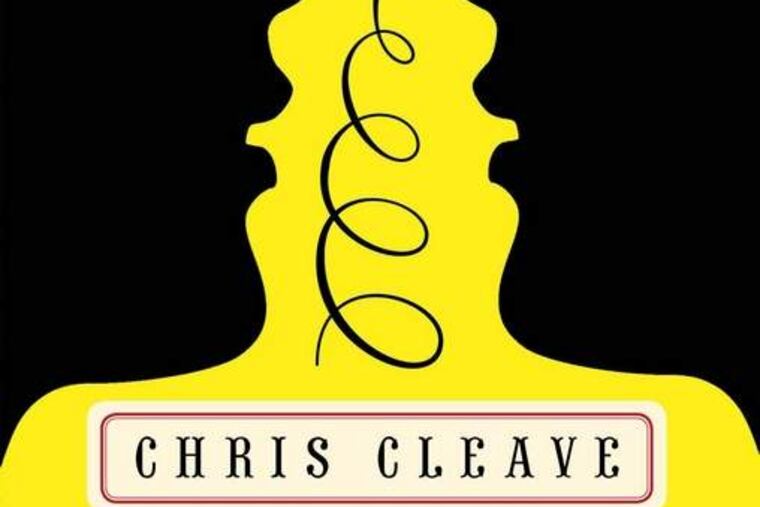‘Gold': A tale of elite cyclists
Gold By Chris Cleave Simon & Schuster. 336 pp. $27 Reviewed by Steven Rea

Gold By Chris Cleave Simon & Schuster. 336 pp. $27
Reviewed by Steven Rea
In track cycling, individual pursuit is simple: Two riders position themselves at opposite ends of the circuit, the gun goes off, and they ride counterclockwise, chasing each other down.
For Kate Meadows and Zoe Castle, the dual — and dueling — heroines of Chris Cleave's perfectly timed and engaging third novel, Gold, starting at opposite ends isn't just something they do in their roles as Britain's top female speed cyclists. They are opposites in almost every way: Zoe, black-haired and beautiful (billboards of her sexily sipping Perrier are all over the U.K.), will do anything to win, jettisoning friends and lovers in her quest for victory. Kate, blond and quiet, is driven by a desire to be the best. She covets her wins, but she covets friendship and family, too.
There is balance in Kate's life. The only time Zoe feels truly balanced is when she is on her bike.
Cleave, the English writer whose Incendiary and Little Bee likewise burrowed inside their female protagonists' heads with empathy and insight, toggles to and fro, from the 2004 Olympic Games in Athens to the early months of 2012, as Kate and Zoe train for this summer's London Olympics. And to 13 years earlier, when the 19-year-old Manchester girls first meet, trying out for Britain's Elite Prospects Programme. That's when they encounter their future coach, a sage soul named Tom Voss — an Aussie who just missed medaling in the 1968 Olympics.
And that's when they meet Jack Argall, a cocky Scottish lad with a mad grin and equally mad cycling skills. Kate tumbles for Jack at that first tryout. And Zoe, ever the competitor, goes after Jack — because he is handsome and athletic and cool, but also because Kate is in love with him.
Cleave, writing omnipotently and with a judicious deployment of killer metaphors (my favorite, the 66-year-old coach reflecting on missing a bronze medal by milliseconds: "the inflections of time were the teeth of a saw, bisecting him"), traces Kate and Zoe's "bittersweet affection of rivals" across these years. There are, of course, the intense pressures of competition, the relentless training, the monitoring of caloric intake and heart rates and body mass.
And then there are more complicated pressures — profoundly complicated. Kate and Jack have married, and while Zoe was off winning gold in Athens, where, Jack, too, was competing with the British team, Kate was nursing a newborn back in Manchester. Eight years later, Kate and Jack's daughter, Sophie, is battling leukemia. Obsessed with all things Star Wars, she is undergoing chemo, and playing down her deep pain and despair so as not to worry her parents. "At night when you had nightmares," she thinks, "and when Mum and Dad came running, you could tell them it was about a wolf or a robber — the stuff that healthy kids had nightmares about — and not Death, that made you so scared you could never even make your voice come out to call for Mum and Dad."
Without getting geeky about it, Cleave describes the regimens and techniques of sprint cycling, the $12,000 carbon fiber machines these would-be Olympians are riding, and nicely evokes the mental state of an athlete pushing it to the limits and hitting the Zone. Here's Zoe, at the National Cycling Centre in Manchester, her anger turned into muscle burn, her heart rate over 140, screaming around the track:
"A very slow peace came over her. Every bitter joule of rage had been converted into speed. She was empty. There was no pain. The air whistled past her ears. She listened intently. That silent music was all there was. It was the sound of the universe showing her mercy. Finally, she was no one."
The publication of Gold right now, of course, with the summer games in London about to kick off, is no coincidence. And it is not a pipe dream to envision Brits on the podium this year — they have dominated the Tour de France, which ends Sunday in Paris. So Cleave has chosen this world fortuitously. And he describes this world astutely, keenly.
And off the track, out of the Lycra skin suits and aerodynamic gear, if Cleave sometimes falls into melodrama, well, life falls into melodrama too, doesn't it?